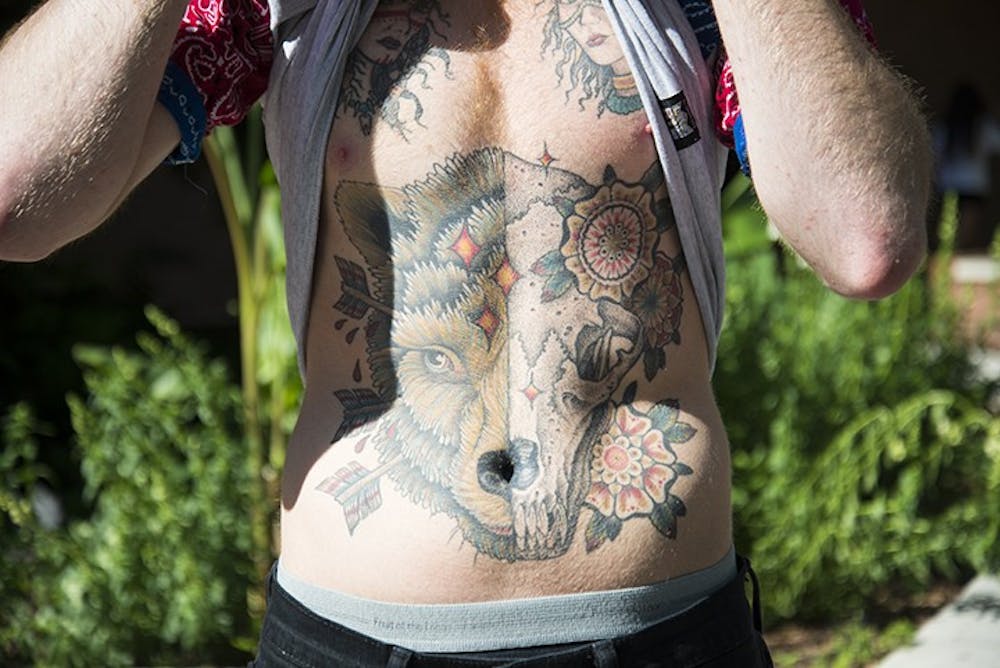Take a walk through campus in the springtime and most likely you'll see exposed tattoos on the bodies of countless students. Young adults these days sport everything from vibrant rose petals to scripted quotes and geometric designs. Even in the typically more conservative south, the popularity of body art and piercings is climbing as our generation stumbles through our college years.

A Harris poll taken in 2012 suggests that 21 percent of U.S. adults have at least one tattoo, including 22 percent of those 18-24 and 30 percent of those 25-29. Although these numbers are increasing, stigmas regarding body ink still exist and can even affect employment for heavily inked job seekers.
As summer approaches and some students are getting ready to graduate and enter the workforce, it’s important to remember that the culture outside of a college campus is much different than what students experience on a daily
basis. The Development Coaches at USC’s Career Center suggest that, while you may have been showing off your ink for the last four years, it might be time to start covering up.

Mark Anthony, Associate Director for Career Development and Experimental Education, emphasized that the rules regarding body art vary not only by industry, but even within them.
“Recently, a recruiter from a major hospitality company was visiting a Carolina classroom and was asked a question by a chef about his tattoos,” Anthony wrote in an email. “The recruiter replied that it is fairly common for kitchen crews to display a good amount of body art, but if the chef wanted to work in the front of the house, directly with customers, they would make him cover that body art up.”
The rules about tattoo exposure can vary by employer as well— some bosses don’t mind if you let your personality show through a bit, but it’s impossible to tell how your body art will be perceived by others, regardless of your intent.

Mike Diaz, first-year dance student, agrees that in certain environments, it’s important to cover up body art. Even though he has a few tattoos himself, he admits that he can understand how some people can be offended by them.
“Tattoos aren’t a big deal, but if you have a copious amount of tattoos, it can get out of control,” Diaz said. “Depending on where you work, you can possibly scare customers. Although in a workplace, there is no judgement, we can’t stop society.”
And unfortunately, society is still finding a way to judge body art. Despite the changing attitudes that most young people have regarding tattoos, sometimes body art is associated with negative attributes, such as delinquency and even gang affiliation. In fact, South Carolina law even prevents artists from giving tattoos above the collarbone.
 Star Jamison, Career Development Coach for the Schools of Mass Communication & Journalism, Education and Music, can appreciate the motive behind tattoos, but she explains that companies share the same freedoms.
Star Jamison, Career Development Coach for the Schools of Mass Communication & Journalism, Education and Music, can appreciate the motive behind tattoos, but she explains that companies share the same freedoms.
“I believe most everyone knows that body art is a form of expression and everyone has a right to express themselves in this way if they choose to do so,” Jamison wrote. “On that same note, organizations also have the right to make hiring decisions based upon company policies and norms as long as they do not impinge on employees’ civil liberties.”
She explained that the Equal Employment Opportunity Commission dictates that employers can’t discriminate on the basis of race, religion, age or gender, but tattoos and piercings fall under the category of dress code, which is under the control of the employer.

However, Diaz suggests that tattoos are just stories that are meant to be shared on your skin.
“Tattoos are self-expression. They are a way that people get out frustration, like any art, and a way for you to tell a story in a different light,” he said. “It’s almost like you’re using your body as a canvas that’s being painted on by the different pieces of your life.”
And if you have a story to tell, it’s not hard to find someone who will turn it into art. Within a 10-mile radius of USC’s campus, there are more than a handful of tattoo shops.

Devine Street Tattoo, which opened about six years ago, is a fairly large shop with very versatile artists. Bryan Spencer, one of the shop’s talented tattoo artists, says he’s given tattoos to all demographics.
“I’ve tattooed everyone from ex-cons to doctors, lawyers, cops and teachers,” Spencer said. Once, he even inked four generations of a family in one sitting — that just goes to show that body art seems to be bridging the age gap.
Having tattoos doesn’t make you degenerate or less employable. Body art is often a beautiful way to make a tribute or share your personality, but as we all know, the workplace isn’t always the best place to show off these characteristics. As you make the transition to the rest of your life — or even just your summer — keep in mind that it’s more than okay to express yourself through art, but just remember to gauge the vibe of your environment first.
So ink away … and happy job hunting.


